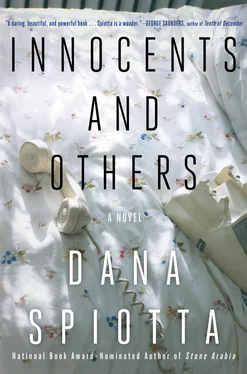The first time she allowed herself a nonsales call was with Tim Estes. Tim was forty and lived in Mamaroneck, New York. Divorced father of three in the upper middle-income bracket. A handwritten notation on the card indicated that he had a gatekeeper — a housekeeper or girlfriend who kept deflecting calls. This was not promising.
In any case, she called and to her delight Estes himself answered the phone.
“Hello,” he said
“May I speak to Tim Estes?”
“This is Tim.” There was something sad in the tone of his voice that made Jelly not want to sell him something. But what then was the purpose of her call?
“Hello, this is Nicole Lamphor.” Jelly hated the name “Amy,” and her phreak nickname, “Jelly,” was too weird and, well, private. She used “Nicole” for sales and now this, whatever this was.
“Do I know you?” he said. She paused and smiled into the phone. Jelly knew that he could feel her smile through the phone — it changed her breathing and then the sound of her voice.
She just said — quietly, slowly — the truth. “I don’t think so, but it is the strangest thing. You sound very familiar to me. Where did you grow up?”
A pause. “In Albany,” he said. “Just outside Albany. In a boring suburb called Guilderland. But I guess all suburbs are boring, right? It’s their point, really.”
“That’s funny. I’m from an upstate suburb too,” she said, “but not that one. I grew up in a suburb of Syracuse called Solvay.” All true.
“And was it boring?” Tim said, a little tease in his voice.
“More awful than boring. It was built to make soda ash out of the local salt beds. I never understood what soda ash was, but growing up there everyone knew the mining had leaked toxic chemicals into the groundwater and the lake. We used to say the kids from Solvay never got lost because they glowed in the dark.”
He laughed. “Well, Guilderland’s main feature was easy access to arterials. Nothing going on, but you could get the hell out of there in any direction. And most everyone does. Leave, that is.”
“Everyone also tries to leave Solvay because there are no good jobs anymore. Depressed economically and poisoned environmentally, instead of merely depressed like most of central New York.”
“Okay, you win, but the name’s nice. Sol-vay.”
“It sounds French,” Jelly said. “Isn’t it cruel to give cold, toxic cities in New York exotic-sounding names? Like Rome, Syracuse, Troy, Solvay?”
“Cruel, yes. But Solvay also sounds like solvent, so apt enough, right?”
“I never thought of that. Oh, gross,” she said, laughing.
She heard Tim laugh. The sound of the laughter released them and made them laugh harder. They talked for twenty minutes more, and when she got off the phone, she promised to call him again soon. He never asked why she had called and she never told him. It was her first “pure” call experience. It was its own reason and there was no “why.”
Jelly loved it: a man giving in to her, falling deliciously in with her. The feeling buzzed through her the rest of the day. Like the sex scenes she used to daydream about, the talk on the phone made her feel a tiny bit radiant and high. The feeling continued when she got home to Oz, and she found she didn’t resent his not talking to her as much. She couldn’t talk to him about it anyway. The past few months a pattern had emerged between them. She wanted to hear someone’s voice besides her own when she got home. Oz was not willing to say more than a short closed answer to her questions about his day, or about the world (so much to be discussed: Nixon, the women’s strike, the war, the Beatles breaking up — although Oz didn’t care for the Beatles, but still). She wouldn’t mind if he shared an idea, or even a joke. So most nights after dinner she dialed into the open-sleeve phone line to listen to the unmoderated free talk. No sales, no money, just people telling stories, talking over each other, talking politics. She called in even though it irritated Oz. He would always leave the apartment for a couple of hours. She couldn’t help it — she really needed it. But on the day she had talked to Tim, she didn’t feel the need to patch into the open sleeve. But Oz went out anyway; it had become his evening habit.
Tim was the first one, and she moved on to others. There was a life expectancy, or a limit to these connections. Soon, very soon in some cases, he would try to see her in person. Or ask for a photograph. This took all the mystery out of it for Jelly, and she would say she would arrange a meeting or send a photo, and then never call again. She started over with someone new. Each time she did this, she became a little more agile at deflecting, a little better at postponing the inevitable escalation. They were at her mercy: she had done this over and over, while it was all new to them, just like the sales calls.
After a few months, Jelly found that almost half her time at the call center was devoted to nonsales calls. Her commissions went down, which she couldn’t afford. But it was now a part of her, a part of how she saw herself. Stopping would be too hard. She cut back; she limited herself to one pure call a day.
She thought it would be good for them, for Oz and Jelly, because she no longer needed the conversation with the phone phreaks in the evenings. Her need for conversation sated, she could stop driving Oz from her house. She even told him she had lost interest in the open sleeve, but to her surprise, Oz still continued to leave the apartment most nights for several hours. Was he with someone else? He vaguely described meetings and a singing group he liked to attend, but he never invited her.
Soon Jelly began going to the movies when Oz went out. She hadn’t told Oz, but her sight was steadily improving. She could see things more clearly on the giant screen. Sometimes she saw white spots or streaks that obscured the image. But she could see the image, if not the details, and she could hear everything. She was so grateful that she could see movies again. When she was growing up, she would spend all her baby-sitting money on movies, usually devoting all of a Saturday to watching one film after another. When she got sick, she thought she had lost the movies forever. But now she went nearly every night. Sometimes she saw the same film two days in a row. This went on for weeks.
The only time Oz and Jelly spent together was in bed. The sex was still there if she was awake when he got home, but often she fell asleep, and they started to have sex less often. Her orgasms were constant for them when they did have sex, but that meant less than she would have guessed. All the parts between them were becoming less and less. She knew, although she didn’t let herself really think about it, that things would end soon. She would try it out on herself over coffee, after she woke next to sleeping Oz and she had worked hard to not wake him. You don’t wake him because it is considerate. No. You don’t wake him because you don’t want him. Don’t want to do what you should, wake him with a touch and a kiss — but then she would shake her head and not think about it. Yes, it felt as though things would end soon, but it also felt as if they might go on like this forever.
Then one Saturday afternoon, right after the wall clock chimed three, Oz made Jelly sit on the couch next to the phone. Oz suggested that they both connect with the open sleeve: Jelly on one line, Oz on the other.
“There is a special phone happening in the next few minutes.” Jelly made the free call to information, and when the operator disconnected, Jelly stayed on the open, free line. She used her blue box to make the tones that got her connected to the open sleeve. Oz was already patched in and then there were others.
Читать дальше












